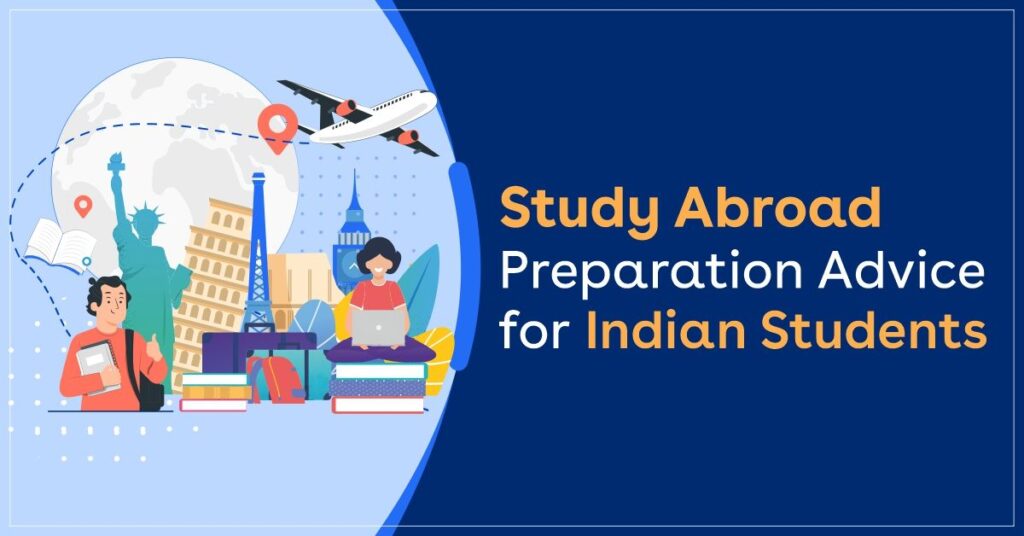25 Nov Preparation Advice for Indian Students to Study Abroad

The decision to study abroad, can be overwhelming.
However, it is highly recommended that you plan well in advance and gather all the information required for studying abroad. This way, you will be able to make an informed decision about where to study, who to study with and how much it will cost you.
Students must check to see if they have all their documents in place.
Before you apply for a visa, it’s important to make sure that you have all the required documents. Your passport must be valid for at least 6 months after your departure date from India. You also need to have proof of enough money in your bank account to support yourself while studying abroad, as well as proof of accommodation (if staying with others or renting). Make sure that there are no health issues that might prevent you from flying long distances!
Following are some of the essentials that you must keep handy prior to your academic semester abroad.
- Passport
- Insurance Details
- Health Records and an insurance certificate of the student
- Academic Certificate: Class X, XII, and graduation along with the offer letter from a college or institution
- Recommendation Letters from previous educational institutions (at least 3)
- English Proficiency Test Score (most preferably IELTS)
- Financial Documents such as bank statements, proof of funds, etc.
- Multiple Passport-Size Photos
- Police Identification Document
Students must seek the advice of their friends, relatives and teachers about what country to study in.
Choosing a country to study in is a big decision and students must seek the advice of their friends, relatives and teachers about what country to study in.
Students should also seek the advice of experts on different countries they are considering. There are experts who will be able to give you valuable information about different educational systems and institutions that you may be interested in attending. You can find these experts at universities or colleges, as well as online forums where people share information with each other.
Other students can also be good resources for finding out more about particular countries because they have already been there before so they know what it’s like living there, how much money is needed for accommodation fees etc..
Students must consider their budget, academic eligibility and career aspirations, when choosing a country.
When choosing a country to study, it is important to consider the cost of living in the country. You should also think about whether you are eligible for a scholarship or other financial support.
Students must research what education loans, work permits and financial support are available.
In the US, students must have a valid work permit if they are non-EU citizens. A work permit is issued by an employer to allow you to legally work in the country. If you don’t have one, you can’t get paid for your time spent on campus or during off-campus internships (which are required for many business degrees). This can be a problem because many colleges charge a high tuition fee—especially Ivy League colleges—and it might take years for your degree to pay off.
In India, students can get up to 5% of their tuition fee waived by working part time at least 25 hours per week while they study abroad. They can also apply for education loans from banks or other lending institutions; however, these loans will usually only cover 50% of the total cost of studies abroad so students should look into other sources of financial support too (such as scholarships and grants).
Applying for scholarships is a great way to support your studies abroad.
Studying abroad is a big step in anyone’s life. It is a great way to gain new knowledge, meet new people and find out more about yourself. But the costs can be prohibitive. Luckily, scholarships are a great way to support your studies abroad. They give you free money towards your tuition fees and living costs, so that you can focus on your studies rather than worrying about finances!
Scholarships also offer many other benefits: they let you build up experience in an area or career which interests you; they allow you to get your name out there among potential employers; and they often come with useful perks like free accommodation or flights home during holidays as well as funding for conferences or field trips.
Planning well before time greatly helps in going abroad for studies.
It is important to plan well before time. Planning helps in making the right choices, saving money and getting the right documents.
Conclusion
We hope the above tips and advice will help you plan your studies abroad. Still, we would like to reiterate that this is a very important decision and needs careful consideration. So, do not rush into anything.

No Comments